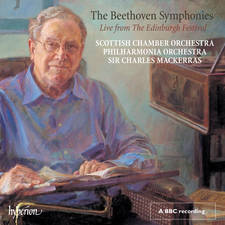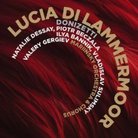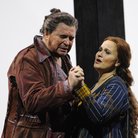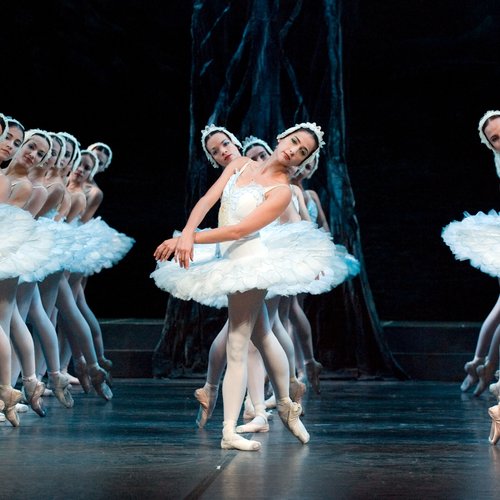Kasper Holten on Tchaikovsky in cinemas
30 January 2013, 09:39 | Updated: 30 January 2013, 12:39
Falling in love, rejection, growing up - and all to the soundtrack of Tchaikovsky's beautiful music. Kasper Holten, Director of Opera for the Royal Opera House, explains what we can expect from his latest production of Eugene Onegin, screened live in cinemas on 20 February.
After a successful run of Birtwistle's opera, The Minotaur, a new stellar cast including tenor Simon Keenlyside and soprano Krassimira Stoyanova is preparing for the latest production at the Royal Opera House: Tchaikovsky's Eugene Onegin. Making his directorial debut with the Royal Opera, Director of Opera, Kasper Holten, shared his thoughts on the transition between the two productions and explained why cinema is the perfect medium for Tchaikovsky's music.
Harrison Birtwistle's opera, The Minotaur, finished on a high yesterday. How did it feel to bring this new work back to the Royal Opera House?
I was extremely proud of it. I shouldn't take much credit for it, it was a piece commissioned by my predecessor and she also decided to put it back as repertoire, but nonetheless I was extremely proud to see it carried out to such great strength. Everything worked, It was a good piece, a good production, a good cast, a good conductor - everything was just at the level it should be. But, most importantly for me, it demonstrates that there is an audience with an appetite for new music. There's often a prejudice that audiences people only want to see La bohème, or La Traviata, and certainly, there is an appetite for the big classics, but there's an appetite for new pieces and that was very encouraging. That's one of the big things for me and Antonio Pappano for the future: we are keen on making new music and new works very central to who we are and what we do. Seeing that the company can handle it and that the audience has an appetite for it was extremely encouraging and made me very proud. It's been a very successful run. The times when you feel like everything is what it should be, those are great moments.
Now The Minotaur is over, the Royal Opera House is taking on a new project: Tchaikovsky's Eugene Onegin, which is screening live in cinemas. How would you say the two productions are different?
It's different for me, because this Onegin is my own production so I'm much more deeply involved in the work. In some ways its different of course, because when you work with new music you're working with a living composer whom you can talk to, and you're still working on a piece that hasn't been seen many times before - in a way doing a new piece is very different from doing a piece that many people have preconceptions about, and have seen many times before, where you're working up against a big tradition, but in some ways it the same. When you do a production, you always have to listen to the piece, read the piece, read the music, and think about why that piece matters to you, using your intuition and your instinct. You need to be honest about it, and try and stay courageous with doing what you think is right for the piece. Before and after you do a show you think about the audience's expectations, but while you're doing a show you have to somehow meet the piece and be honest about it - that's the same process whether it's a new piece or an old one.
So, what is it that the audience can expect from your latest production?
I hope they will see a production which creates a strong emotional identification. I think the point of Tchaikovsky's story is that it's really about stuff that we all go through; it's not about kings and princes, or far away countries, gods, or magic - it's about falling in love, about being rejected, about growing up. It's about things that we can all identify with. I hope it will feel poetic, as I don't think Eugene Onegin is a piece you can take a sledgehammer to! Some pieces are much more resistant; if you do a big Wagner work, for instance, you can do a lot with it and it will still have resistance, but I think Onegin has quite intimate and fragile stories so you need to treat it with great respect, and that's the beauty of it. We've tried to work on the characters' complexity, so you don't just get the black and white picture that people often think about when you think about Onegin, where Tatyana, the lead female character, is just good and innocent, and Onegin is the evil seducer. I think the characters are much more interesting when they're much more complex. I hope people with feel that it's an intimate piece. It's quite delicate in the way it tells the story, it has an emotional identification, but it still feels poetic.
How do you portray that delicacy and that intimacy on the big screen in cinemas?
It's great in cinemas because the camera can go close. It's much more difficult, in a way, to create intimacy in an opera house, where people often sit very far away. We're using a set which forces the action very far downstage so you almost feel that you're in the same room with the characters, and hopefully the way the singers relate to each other means that although you are a bit away from them, you still feel you can live through these intimate relationships and emotions. It's not about the big spectacle, or the big impressive scenes, but it's really about people reacting to each other.
And Tchaikovsky's music is so beautiful…
He's really a perfect opera composer. His opera has this tremendous emotional strength, but it's also soaked in melancholy, and that's something we tried to use in the production. It's an opera about passion and about the big emotions of youth, and there's a sense of melancholy in the music all the time. The two main characters are going through this journey knowing full-well that things will go wrong, but still trying to understand why it's happening.
Looking further ahead, what's next for you and the Royal Opera House?
Our next new work is George Benjamin's Written on Skin. It's a really strong piece and it's already been celebrated throughout the world, so we'll be giving that its UK premiere on 8 March in Katie Mitchell's brilliant production. There's also our new production of Britten's Gloriana in June, directed by Richard Jones, who in my opinion is the best UK opera director, if not the best opera director in the world at the moment, reviving and directing afresh this Britten masterpiece for the Britten Centenary. So, we're really excited about the spring and our new productions.
The Royal Opera House's cinema screening of La bohème was their best performing film to date, second only to the film version of Les Misérables on 15 January. Kasper Holten's directorial debut at the Royal Opera House, Tchaikovsky's Eugene Onegin, opens on 4 February and will be broadcast live in cinemas worldwide on 20 February 2013.





